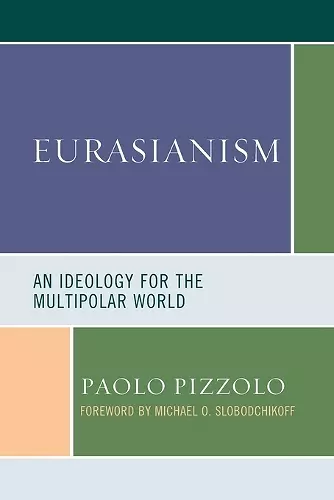Eurasianism
An Ideology for the Multipolar World
Format:Paperback
Publisher:Lexington Books
Published:8th Mar '22
Should be back in stock very soon
This paperback is available in another edition too:
- Hardback£99.00(9781793604798)

Eurasianism: An Ideology for the Multipolar World investigates the ideology of Eurasianism, a political doctrine that founds its principles on geopolitics and conservatism. Specifically, the book examines neo-Eurasianist thought and its implications for the international system. After collocating Eurasianism in the spectrum of conservative theories, the research analyzes its historical evolution from the early 20th century to its contemporary manifestations. Pizzolo describes the liaison between Eurasianism and geopolitics, describing the nature of geopolitics and the main theories that highlight the relevance of the Eurasian landmass, including Mackinder’s “Heartland theory”, Spykman’s “Rimland theory”, and Haushofer’s “Kontinentalblock” project. The book also focuses on the central elements of the neo-Eurasianist ideology, including the key features of the so-called “Fourth Political Theory”, arguing that Eurasianism could represent a theoretical contribution for the advent of the multipolar world.
Since the disintegration of the Soviet Union, Russia's efforts to define itself as well as to reknit the Soviet space has generated political and scholarly attention in the West as well as in Russia. At the center of interest is "Eurasianism," which serves to define Russia as both European and Asian and as a scaffold for various projects to integrate former Soviet republics. Defining "Eurasianism" as an ideology, Pizzolo (LUISS Guido Carlo Univ., Italy) addresses the concept in the context of geopolitical theories, notably those of Halford Mackinder and Nicholas J. Spykman. This covers familiar ground, but his narrative on Aleksandr Dugin's "neo-Eurasianism" is a useful study of the more controversial aspects of "Eurasianism." Among other things, Pizzolo discusses Dugin's "Fourth Political Theory," a peculiar melding of liberalism, fascism, and Marxism that is intended to replace Western Atlanticism as a dominant world order. The international system, Dugin argues, is becoming multipolar. Pizzolo also addresses Dugin's much-criticized advocacy of Russian imperialism. Pizzolo's study is well documented with a bibliography rich in Russian sources. The book is strongly recommended for all university readers. Summing Up: Highly recommended. Lower-division undergraduates through faculty.
* Choice *“Eurasianism: An Ideology for the Multipolar World represents a useful study to understand the dynamics of the current international system in its evolution towards a post-unipolar context. By analyzing the Eurasianist doctrine and the main geopolitical theories behind it, Pizzolo addresses all the relevant sources and cites the most important authors from the field. The book embodies a valuable tool and a noteworthy contribution for the investigation of international relations.” -- Gabriele Natalizia, La Sapienza University of Rome
“The twenty-first century and multipolar world need formulas of understanding in terms of the reality of international politics and post-ideological new paradigms: among them, ‘Eurasia’ is not only a geographical paradigm, but also a longstanding cultural reference for the Russian world. Within this book, ‘Eurasianism’ is explained as the essential lens to read both the Russian soul and Russia’s links with neighbors and other countries.” -- Andrea Carteny, La Sapienza University of
ISBN: 9781793604811
Dimensions: 230mm x 153mm x 22mm
Weight: 454g
1 pages